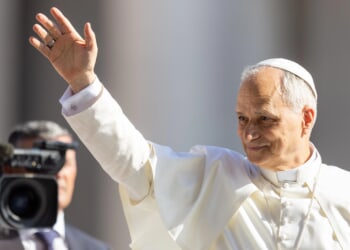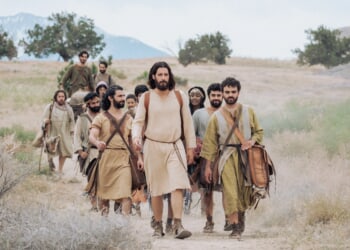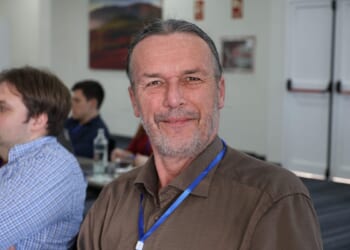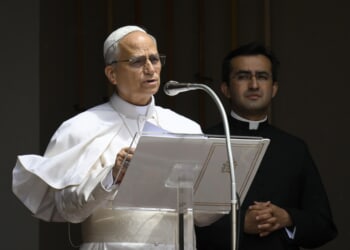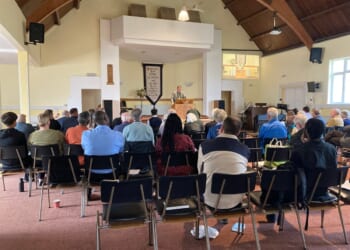Vatican City, Jun 13, 2025 /
16:39 pm
Pope Leo XIV stated that “the gravest poverty is not to know God” and that having him accompany us on the journey of life puts material wealth into perspective, because “we discover the real treasure that we need.”
“Wealth often disappoints and can lead to tragic situations of poverty — above all the poverty born of the failure to recognize our need for God and of the attempt to live without him,” the pontiff noted.
The Holy Father made these observations in his message, released June 13 by the Vatican press office, for the ninth World Day of the Poor, which will be held on Sunday, Nov. 16.
As Pope Francis did when he decried the globalization of indifference, Pope Leo warned of the risk of “becoming hardened and resigned” in the face of new forms of impoverishment.
He thus framed the social responsibility of promoting the common good, which characterizes the Catholic Church, as grounded in “God’s creative act, which gives everyone a share in the goods of the earth,” and like these goods, “the fruits of human labor should be equally accessible to all.”
The pontiff quoted St. Augustine on the subject: “You give bread to a hungry person; but it would be better if none were hungry, so that you would have no need to give it away. You clothe the naked, but would that all were clothed and that there be no need for supply this lack.”
The Holy Father made it clear that helping the poor is “a matter of justice before it is a question of charity.” He also noted how when we encounter poor or impoverished people, sometimes “we too may have less than before and are losing what once seemed secure: a home, sufficient food for each day, access to health care and a good education, information, religious freedom, and freedom of expression.”
For the pontiff, the World Day of the Poor seeks to remind the Church that the poor are “at the heart of all our pastoral activity,” not only of its ”charitable work but also of the message that she celebrates and proclaims.”
“God took on their poverty in order to enrich us through their voices, their stories, and their faces,” he noted in the message he signed June 13, the feast of St. Anthony of Padua, the patron saint of the poor.
In fact, in the text he made it clear that the poor “are not a distraction for the Church but our beloved brothers and sisters.” In this sense, he emphasized that “by their lives, their words, and their wisdom, they put us in contact with the truth of the Gospel.”
The Holy Father emphasized in his message that the poor are not mere “recipients” of the Church’s pastoral care but rather defined them as “creative subjects” who challenge us “to find novel ways of living out the Gospel today.”
In this way, he pointed out that every form of poverty is a call “to experience the Gospel concretely and to offer effective signs of hope.”
The pope noted how people without resources can become witnesses of a “a strong and steadfast hope, precisely because they embody it in the midst of uncertainty, poverty, instability, and marginalization.”
“They cannot rely on the security of power and possessions; on the contrary, they are at their mercy and often victims of them. Their hope must necessarily be sought elsewhere,” he added.
Thus, he indicated that when God is placed at the center as “our first and only hope,” it is precisely when “we too pass from fleeting hopes to a lasting hope.”
Worst discrimination suffered by poor is ‘lack of spiritual care’
(Story continues below)
Subscribe to our daily newsletter
The pontiff cited the encyclical Evangelii Gaudium of his predecessor, Pope Francis, who stated that the worst discrimination suffered by the poor is “the lack of spiritual care.”
“This is a rule of faith and the secret of hope: All this earth’s goods, material realities, worldly pleasures, economic prosperity, however important, cannot bring happiness to our hearts,” he emphasized.
The Holy Father also reflected on the “circular relationship” that exists between the three theological virtues: faith, hope, and charity. “Hope is born of faith, which nourishes and sustains it on the foundation of charity, the mother of all virtues. All of us need charity, here and now,” he said.
Pope Leo therefore affirmed that charity is a reality that “engages us and guides our decisions toward the common good” and pointed out that “those who lack charity not only lack faith and hope; they also rob their neighbors of hope.”
Referring specifically to the Christian hope that the Word of God proclaims, he noted that it is a “certainty at every step of life’s journey” because it does not depend on human strength “but on the promise of God, who is always faithful.”
For this reason, he said that Christians, from the beginning, have sought to identify hope with the symbol of the anchor, which provides stability and security. “Amid life’s trials, our hope is inspired by the firm and reassuring certainty of God’s love, poured into our hearts by the Holy Spirit. That hope does not disappoint,” he reiterated.
Charity is the greatest social commandment of the Church
Therefore, Leo emphasized that the biblical summons to hope entails “the duty to shoulder our responsibilities in history, without hesitation,” noting that “charity, in fact, is the greatest social commandment,” as stated in No. 1889 of the Catechism of the Catholic Church.
The pontiff explained that “poverty has structural causes that must be addressed and eliminated. In the meantime, each of us is called to offer new signs of hope that will bear witness to Christian charity, just as many saints have done over the centuries.”
For the pope, hospitals and schools are institutions created to reach out to the most vulnerable and marginalized, and they “should be part of every country’s public policy.” However, he lamented that “wars and inequalities often prevent this from happening.”
He also highlighted as concrete examples of hope “group homes, communities for minors, centers for listening and acceptance, soup kitchens, homeless shelters, and schools for low-income students.”
And, he added: “How many of these quiet signs of hope often go unnoticed and yet are so important for setting aside our indifference and inspiring others to become involved in various forms of volunteer work!”
Finally, he called for promoting the development of policies to combat “forms of poverty both old and new, as well as implementing new initiatives to support and assist the poorest of the poor.”
“Labor, education, housing, and health are the foundations of a security that will never be attained by the use of arms. I express my appreciation for those initiatives that already exist, and for the efforts demonstrated daily on the international level by great numbers of men and women of goodwill,” he said.
This story was first published by ACI Prensa, CNA’s Spanish-language news partner. It has been translated and adapted by CNA.




